TEST BANK WORLD
Welcome to this page where you will find well elaborated study materials such as test banks, study guides, exams , quizzes, summaries and case studies.
The materials are of high quality and 100% verified to provide you with the best grades.
The seller is available for any assistance needed in your studies.
WISHING YOU ALL THE BEST.
- 1710
- 0
- 6
Community
- Followers
- Following
55 Reviews received
1717 items
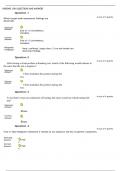
NURSING 1001 QUESTIONS AND ANSWERS
Which lymph node assessment findings are abnormal? Selected Answer: Size of 1.5 centimeters, immobile. 4 out of 4 points Correct Answer: Size of 1.5 centimeters, immobile. Response Feedback: Hard, confluent, larger than 1.5 cm and tender are abnormal findings. Question 2 After having a client perform a Romberg test, which of the following would indicate to the nurse that the test is negative? Selected Answer: Client maintains the position during t...
- Exam (elaborations)
- • 13 pages •
Which lymph node assessment findings are abnormal? Selected Answer: Size of 1.5 centimeters, immobile. 4 out of 4 points Correct Answer: Size of 1.5 centimeters, immobile. Response Feedback: Hard, confluent, larger than 1.5 cm and tender are abnormal findings. Question 2 After having a client perform a Romberg test, which of the following would indicate to the nurse that the test is negative? Selected Answer: Client maintains the position during t...
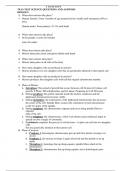
TEAS TEST SCIENCE QUESTIONS AND ANSWERS BIOLOGY
1) When does meiosis take place? ⇨ Human females: From 3 months of age prenatal (in the womb) until menopause (40's to 50's) Human males: From puberty (12-13) until death 2) Where does meiosis take place? ⇨ In the gonads: ovaries for females testes for males. 3) When does mitosis take place? ⇨ Mitosis takes place from conception (birth) until death. 4) Where does mitosis take place? ⇨ Mitosis takes place in all cells of the body. 5) How many daughter cells are pro...
- Exam (elaborations)
- • 13 pages •
1) When does meiosis take place? ⇨ Human females: From 3 months of age prenatal (in the womb) until menopause (40's to 50's) Human males: From puberty (12-13) until death 2) Where does meiosis take place? ⇨ In the gonads: ovaries for females testes for males. 3) When does mitosis take place? ⇨ Mitosis takes place from conception (birth) until death. 4) Where does mitosis take place? ⇨ Mitosis takes place in all cells of the body. 5) How many daughter cells are pro...
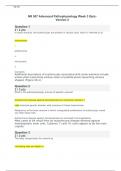
NR 507 Advanced Pathophysiology Exam elaborations
NR 507 Advanced Pathophysiology questions and answers
- Package deal
- • 10 items •
- NR 507 Pathophysiology Exam Questions and Answers • Exam (elaborations)
- NR 507 FINAL EXAM QUESTIONS AND ANSWERS • Exam (elaborations)
- NR 507 Week 4 Midterm Exam Review • Exam (elaborations)
- NR 507 Pathophysiology midterm exam Review Q&A • Exam (elaborations)
- NR 507 Advanced Pathophysiology Week 3 Quiz Review • Exam (elaborations)
- And more ….
NR 507 Advanced Pathophysiology questions and answers
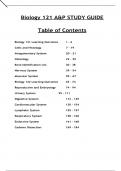
Biology 121 A&P STUDY GUIDE
Anatomy and Physiology 121 1. List the organelles in a typical animal cell and describe the function of each. 2. Describe the cellular organelles contribution to homeostasis. 3. Describe in detail the processes involved in cellular metabolism. 4. List typical tissue types found in the human body and describe the structure and function of each. 5. List the components of the integumentary system and define the function of each. 6. Identify the bones and bone markings of the hum...
- Exam (elaborations)
- • 188 pages •
Anatomy and Physiology 121 1. List the organelles in a typical animal cell and describe the function of each. 2. Describe the cellular organelles contribution to homeostasis. 3. Describe in detail the processes involved in cellular metabolism. 4. List typical tissue types found in the human body and describe the structure and function of each. 5. List the components of the integumentary system and define the function of each. 6. Identify the bones and bone markings of the hum...

NR 507 Advanced Pathophysiology Week 3 Quiz- Version 2
In some anemias, the erythrocytes are present in various sizes, which is referred to as anisocytosis. poikilocytosis. microcytosis. isocytosis. Additional descriptors of erythrocytes associated with some anemias include anisocytosis (assuming various sizes) or poikilocytosis (assuming various shapes) (Figure 26-1). What is the pathophysiologic process of aplastic anemia? Autoimmune disease against hematopoiesis by activated cytotoxic T cells Inherited genetic disorder with recessi...
- Package deal
- Exam (elaborations)
- • 14 pages •
In some anemias, the erythrocytes are present in various sizes, which is referred to as anisocytosis. poikilocytosis. microcytosis. isocytosis. Additional descriptors of erythrocytes associated with some anemias include anisocytosis (assuming various sizes) or poikilocytosis (assuming various shapes) (Figure 26-1). What is the pathophysiologic process of aplastic anemia? Autoimmune disease against hematopoiesis by activated cytotoxic T cells Inherited genetic disorder with recessi...
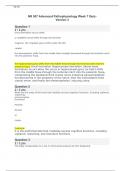
NR 507 Advanced Pathophysiology Week 7 Quiz- Version 3
Uncal herniation occurs when a cerebellar tonsil shifts through the foramen magnum. the cingulate gyrus shifts under the falx cerebri. the diencephalon shifts from the middle fossa straight downward through the tentorial notch into the posterior fossa. the hippocampal gyrus shifts from the middle fossa through the tentorial notch into the posterior fossa. Uncal herniation (hippocampal herniation, lateral mass herniation) occurs when the uncus or hippocampal gyrus (or both) shifts from t...
- Package deal
- Exam (elaborations)
- • 16 pages •
Uncal herniation occurs when a cerebellar tonsil shifts through the foramen magnum. the cingulate gyrus shifts under the falx cerebri. the diencephalon shifts from the middle fossa straight downward through the tentorial notch into the posterior fossa. the hippocampal gyrus shifts from the middle fossa through the tentorial notch into the posterior fossa. Uncal herniation (hippocampal herniation, lateral mass herniation) occurs when the uncus or hippocampal gyrus (or both) shifts from t...
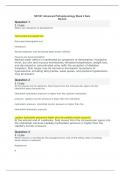
NR 507 Advanced Pathophysiology Week 2 Quiz Review
Which are indications of dehydration? Tachycardia and weight loss Decreased hemoglobin and hematocrit Muscle weakness and decreased deep tendon reflexes Polyuria and hyperventilation Marked water deficit is manifested by symptoms of dehydration: headache, thirst, dry skin and mucous membranes, elevated temperature, weight loss, and decreased or concentrated urine (with the exception of diabetes insipidus). Skin turgor may be normal or decreased. Symptoms of hypovolemia, including tachy...
- Package deal
- Exam (elaborations)
- • 17 pages •
Which are indications of dehydration? Tachycardia and weight loss Decreased hemoglobin and hematocrit Muscle weakness and decreased deep tendon reflexes Polyuria and hyperventilation Marked water deficit is manifested by symptoms of dehydration: headache, thirst, dry skin and mucous membranes, elevated temperature, weight loss, and decreased or concentrated urine (with the exception of diabetes insipidus). Skin turgor may be normal or decreased. Symptoms of hypovolemia, including tachy...

NR 507 Advanced Pathophysiology Week 1 Quiz Review
Cells in may act as a reservoir in which HIV can be relatively protected from antiviral drugs. the lungs the central nervous system the thymus gland bone marrow HIV may persist in regions where the antiviral drugs are not as effective, such as the CNS. What is the role of reverse transcriptase in HIV infection? It transports the RNA into the cell nucleus. It converts single DNA into double-stranded DNA. It is needed to produce integrase. It converts RNA into double-stranded...
- Package deal
- Exam (elaborations)
- • 15 pages •
Cells in may act as a reservoir in which HIV can be relatively protected from antiviral drugs. the lungs the central nervous system the thymus gland bone marrow HIV may persist in regions where the antiviral drugs are not as effective, such as the CNS. What is the role of reverse transcriptase in HIV infection? It transports the RNA into the cell nucleus. It converts single DNA into double-stranded DNA. It is needed to produce integrase. It converts RNA into double-stranded...
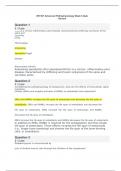
NR 507 Advanced Pathophysiology Week 6 Quiz Review
is a chronic inflammatory joint disease characterized by stiffening and fusion of the spine and sacroiliac joints. Fibromyalgia Ankylosing spondylitis Paget disease Rheumatoid arthritis Ankylosing spondylitis (AS) (spondyloarthritis) is a chronic, inflammatory joint disease characterized by stiffening and fusion (ankylosis) of the spine and sacroiliac joints. Considering the pathophysiology of osteoporosis, what are the effects of extracellular signal regulated kinases (ERKs) and ...
- Package deal
- Exam (elaborations)
- • 16 pages •
is a chronic inflammatory joint disease characterized by stiffening and fusion of the spine and sacroiliac joints. Fibromyalgia Ankylosing spondylitis Paget disease Rheumatoid arthritis Ankylosing spondylitis (AS) (spondyloarthritis) is a chronic, inflammatory joint disease characterized by stiffening and fusion (ankylosis) of the spine and sacroiliac joints. Considering the pathophysiology of osteoporosis, what are the effects of extracellular signal regulated kinases (ERKs) and ...
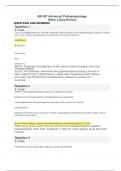
NR 507 Advanced Pathophysiology Week 3 Quiz Review
Clinical manifestations of mild to moderate splenomegaly and hepatomegaly, bronze-colored skin, and cardiac dysrhythmias are indicative of which anemia? Sideroblastic Aplastic Pernicious Iron deficiency Mild to moderate enlargement of the spleen (splenomegaly) and liver (hepatomegaly) occurs. Occasionally, abnormal skin pigmentation (bronze colored) is seen. Heart rhythm disturbances, along with congestive heart failure, are major life-threatening complications related to cardiac iron over...
- Package deal
- Exam (elaborations)
- • 17 pages •
Clinical manifestations of mild to moderate splenomegaly and hepatomegaly, bronze-colored skin, and cardiac dysrhythmias are indicative of which anemia? Sideroblastic Aplastic Pernicious Iron deficiency Mild to moderate enlargement of the spleen (splenomegaly) and liver (hepatomegaly) occurs. Occasionally, abnormal skin pigmentation (bronze colored) is seen. Heart rhythm disturbances, along with congestive heart failure, are major life-threatening complications related to cardiac iron over...

NURS-6521N-55, Advanced Pharmacology Final Exam. Week 11. Review
NURS-6521 ,Advanced Pharmacology Mid term exam review
NURS-6521N-56,Advanced Pharmacology Final exam
Advanced Pharmacology Final Review
NURS-6521N-31,Advanced Pharmacology Final Examination Review